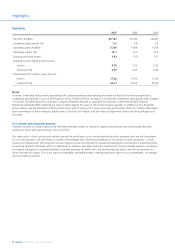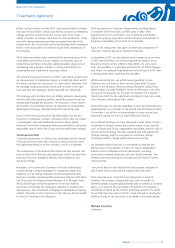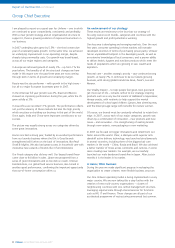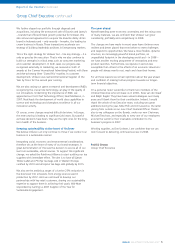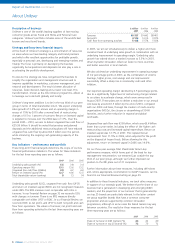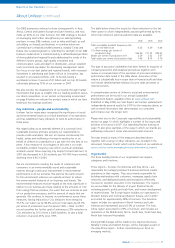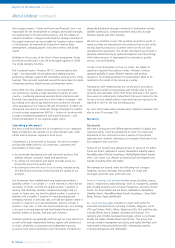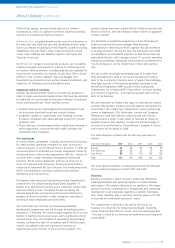Unilever 2007 Annual Report Download - page 13
Download and view the complete annual report
Please find page 13 of the 2007 Unilever annual report below. You can navigate through the pages in the report by either clicking on the pages listed below, or by using the keyword search tool below to find specific information within the annual report.
Unilever Annual Report and Accounts 2007 11
Report of the Directors continued
About Unilever continued
Unilever has been fully compliant with the ruling in the Irish case
since October 2003, when we lifted cabinet exclusivity from
outlets that only have HB freezers (Unilever was not ordered to
abandon cabinet exclusivity altogether). Parallel proceedings
between HB Ice Cream and Masterfoods (re-named Mars) before
the Irish High Court, which had been deferred pending the ECJ
ruling, were reopened in 2007 at the request of Mars to claim
damages from Unilever. We will resist any claim for compensation
for losses that cannot be directly attributed to the practices
prohibited by the European Commission’s 1998 decision as
regards Ireland.
The Commission decision applied only to Ireland. The relevance of
its reasoning to other markets depends on a detailed factual
assessment of the effects of cabinet exclusivity in each market.
Unilever has given careful consideration to the potential
application of the reasoning in the Irish case to its cabinet policies
in other EU countries. The majority of markets are not affected by
this development. However we have taken a number of
commercial steps to avoid extending the debate further, in the
interest of focusing on our day-to-day business.
Since the ECJ ruling, Mars has nonetheless sought to bring claims
against Unilever before authorities and courts in a number of
countries. Mars’ allegations must be scrutinised in the light of
prevailing national market conditions, this can be a complex and
lengthy process. However by 26 October 2007 a civil claim by
Mars in Germany had already been dismissed by the Hamburg
Regional Court. Although Mars has appealed this decision, we
will continue vigorously to resist Mars’ claim.
Mars also brought a claim before the Swedish Market Court,
which on 25 September 2007 issued an interim order that broadly
reflects Unilever’s current policy as regards the loan of freezer
cabinets, namely that retail customers in Sweden must be free to
decide what products to store in Unilever cabinets where these
are the only cabinets used by the retailer. The Court’s order did
not require material changes beyond those already made by
Unilever’s Swedish business, GB Glace. The main proceedings
remain ongoing but the Market Court does not have jurisdiction
to make damages awards.
An investigation by the Portuguese competition authority is
ongoing since March 2007. Portuguese law prevents us from
disclosing details of this investigation. Unilever engages
proactively with the authority.
In Italy the Consiglio di Stato overturned a 2003 decision by the
Italian competition authority (‘ICA’) that responded positively to a
notification by Unilever of its policy in relation to outlet exclusivity.
The Consiglio di Stato made its decision on 24 July 2007 on the
basis that Unilever’s market position in Italy had not been
sufficiently investigated by the ICA. Unilever has always engaged
proactively with the ICA and continues to do so to secure a
prompt resolution to the outstanding issues.
We cannot exclude that Mars may seek to bring claims in other
jurisdictions, in which case Unilever can be expected to defend its
position vigorously. We believe that our true strength lies in the
appeal and quality of our ice cream brands. By way of illustration
of the point, in the UK since 2000, when cabinet exclusivity was
effectively abandoned by Unilever, there has not been any
material change in Unilever’s relevant market share.
Other competition issues
In 2006 the French competition authorities commenced an inquiry
into potential competition law infringements in France involving a
number of consumer goods companies in the home and personal
care sector, including Unilever France and Lever Fabergé France,
both subsidiaries of the Unilever Group. Interviews have been
conducted with present and former members of our staff and
documents have been supplied to the French authorities. No
statement of objections or proposals for fines have yet been
lodged against either Unilever France or Lever Fabergé France as
the authorities’ investigation has had to be restarted following
procedural challenge. Accordingly, the potential financial
implications, if any, of this investigation cannot yet be assessed. A
statement of objections is however expected in the near future.
On 14 March 2007 representatives from the German Federal
Cartel Office carried out an inspection at the offices of Unilever
Deutschland GmbH in Hamburg. The inspection was in relation to
the home and personal care market in Germany. Statements of
objections have been received by and fines have been imposed on
Unilever Deutschland, which currently intends to defend its
position by way of appeal.
On 25 February 2008, a purported class action lawsuit was filed
in the United States of America in the United States District Court
for the Northern District of Illinois alleging, relying upon the
German investigation described above, that Unilever N.V., Unilever
PLC and Unilever United States, Inc. allegedly conspired with
certain other companies to fix prices of oral, home and personal
care products in the United States. The Unilever parties deny the
claims and intend to defend the action.
Tax cases Brazil
During 2004 the Federal Supreme Court in Brazil (local acronym
STF) announced a review of certain cases that it had previously
decided in favour of taxpayers. Because of this action we
established a provision in 2004 for the potential repayment
of sales tax credits in the event that the cases establishing
precedents in our favour are reversed. Since that time we have
continued to monitor the situation and have made changes
as appropriate to the amount provided.
In June 2007, the Supreme Court ruled against the taxpayers in
one of these cases. Management believes that the amount
provided in Unilever’s accounts should be sufficient to cover the
amount of the tax in question, but industry associations (of which
Unilever is a member) are currently attempting to negotiate a
settlement with the Federal Revenue Service to reduce or avoid
the payment of interest and/or penalties on such amounts.
Management is optimistic that such negotiations will lead to a
settlement, but no assurance can be given that a settlement will
be reached or that the amount of any interest or penalties will be
covered by such provision.
Also during 2004 in Brazil, and in common with many other
businesses operating in that country, one of our Brazilian
subsidiaries received a notice of infringement from the Federal
Revenue Service. The notice alleges that a 2001 reorganisation
of our local corporate structure was undertaken without valid
business purpose. If upheld, the notice could result in a tax claim
in respect of prior years. The 2001 reorganisation was comparable
with that used by many companies in Brazil and we believe that
the likelihood of a successful challenge by the tax authorities is
remote. While this view is supported by the opinion of outside
counsel there can be no guarantee of success on the merits.



